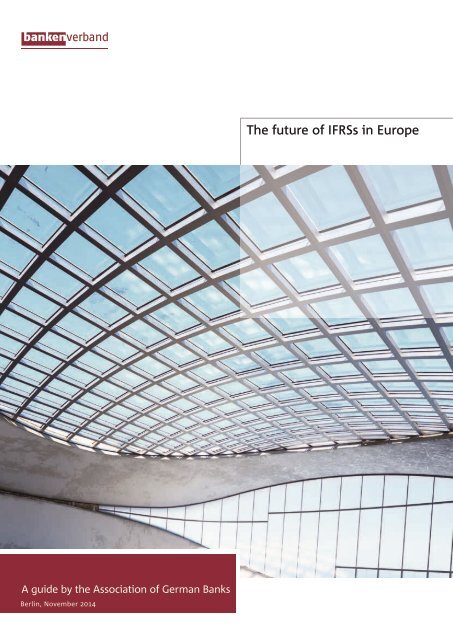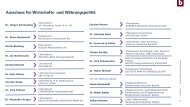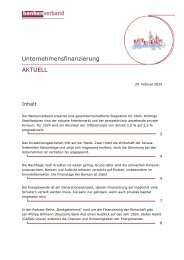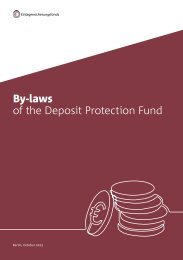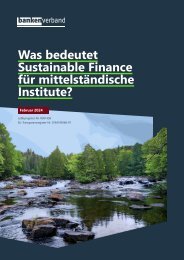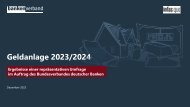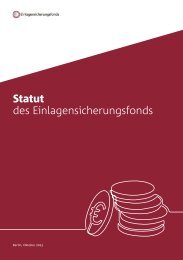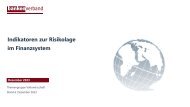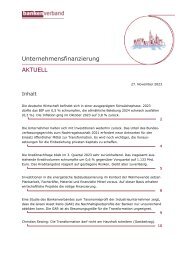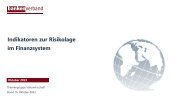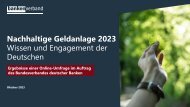The future of IFRSs in Europe
Since the adoption of the IAS Regulation in 2002, the International Financial Reporting Standards (IFRSs) have served as the authoritative accounting rules for publicly traded companies in the European Union.
Since the adoption of the IAS Regulation in 2002, the International Financial Reporting Standards (IFRSs) have served as the authoritative accounting rules for publicly traded companies in the European Union.
Create successful ePaper yourself
Turn your PDF publications into a flip-book with our unique Google optimized e-Paper software.
<strong>The</strong> <strong>future</strong> <strong>of</strong> <strong>IFRSs</strong> <strong>in</strong> <strong>Europe</strong><br />
A guide by the Association <strong>of</strong> German Banks<br />
Berl<strong>in</strong>, November 2014
<strong>The</strong> <strong>future</strong> <strong>of</strong> <strong>IFRSs</strong> <strong>in</strong> <strong>Europe</strong><br />
Berl<strong>in</strong>, November 2014<br />
Association <strong>of</strong> German Banks
All under one ro<strong>of</strong> …<br />
Through International F<strong>in</strong>ancial Report<strong>in</strong>g Standards<br />
(<strong>IFRSs</strong>), the EU br<strong>in</strong>gs together the account<strong>in</strong>g<br />
rules apply<strong>in</strong>g to publicly traded companies under<br />
one ro<strong>of</strong>. For this reason, the transparent ro<strong>of</strong> is a<br />
fitt<strong>in</strong>g visual accompaniment to the content <strong>of</strong> this<br />
brochure.<br />
4 <strong>The</strong> <strong>future</strong> <strong>of</strong> <strong>IFRSs</strong> <strong>in</strong> <strong>Europe</strong>
Contents<br />
1 <strong>The</strong> <strong>future</strong> <strong>of</strong> <strong>IFRSs</strong> <strong>in</strong> <strong>Europe</strong> 6<br />
2 Significance and development <strong>of</strong> <strong>IFRSs</strong> <strong>in</strong> <strong>Europe</strong> 8<br />
2.1 Function and limitations <strong>of</strong> account<strong>in</strong>g standards 8<br />
2.2 Account<strong>in</strong>g and regulation 8<br />
2.3 IASB structure 8<br />
2.4 International standard-sett<strong>in</strong>g process 11<br />
2.5 <strong>IFRSs</strong> and supervisory law 12<br />
2.6 <strong>Europe</strong>an account<strong>in</strong>g architecture 15<br />
2.6.1 Implementation <strong>of</strong> <strong>IFRSs</strong> <strong>in</strong> EU law (endorsement) 12<br />
2.6.2 Reorganisation <strong>of</strong> EFRAG – Maystadt Review 13<br />
2.6.3 Role <strong>of</strong> the <strong>Europe</strong>an Parliament 15<br />
2.7 Enforcement 16<br />
2.7.1 Role <strong>of</strong> ESMA 16<br />
2.8 Outlook 17<br />
3 Glossary 18
1<br />
<strong>The</strong> <strong>future</strong> <strong>of</strong> <strong>IFRSs</strong> <strong>in</strong> <strong>Europe</strong><br />
S<strong>in</strong>ce the adoption <strong>of</strong> the IAS Regulation (Regulation<br />
(EC) No 1606/2002 on the application <strong>of</strong> <strong>in</strong>ternational<br />
account<strong>in</strong>g standards) <strong>in</strong> 2002, the International<br />
F<strong>in</strong>ancial Report<strong>in</strong>g Standards (<strong>IFRSs</strong>) have served<br />
as the authoritative account<strong>in</strong>g rules for publicly<br />
traded companies <strong>in</strong> the <strong>Europe</strong>an Union. Disclosure<br />
<strong>of</strong> f<strong>in</strong>ancial <strong>in</strong>formation is no longer conceivable for<br />
such companies without <strong>IFRSs</strong>. This is because, besides<br />
be<strong>in</strong>g an “admission ticket” to the <strong>in</strong>ternational capital<br />
markets, the application <strong>of</strong> <strong>IFRSs</strong> helps to make f<strong>in</strong>ancial<br />
statements more mean<strong>in</strong>gful and comparable and to<br />
harmonise <strong>in</strong>ternal and external account<strong>in</strong>g. Many EU<br />
member states have therefore expanded the use <strong>of</strong><br />
<strong>IFRSs</strong> on a compulsory or voluntary basis to cover other<br />
entities outside the mandatory scope <strong>of</strong> application.<br />
<strong>The</strong> International Account<strong>in</strong>g Standards Board<br />
(IASB) was set up as a private standard-sett<strong>in</strong>g body<br />
composed <strong>of</strong> representatives from different countries.<br />
<strong>The</strong> IASB has played a major role over the past few<br />
years <strong>in</strong> creat<strong>in</strong>g <strong>in</strong>ternationally recognised account<strong>in</strong>g<br />
standards geared to the needs <strong>of</strong> addressees. Two<br />
developments have given cause for concern recently,<br />
however. Firstly, the US has turned its back to some<br />
extent on the pr<strong>in</strong>ciple <strong>of</strong> uniform global standards.<br />
<strong>The</strong> US standard-sett<strong>in</strong>g body FASB has, for example,<br />
withdrawn from jo<strong>in</strong>t work on some projects and is<br />
pursu<strong>in</strong>g its own agenda. Secondly, the debate on<br />
a big enough say for <strong>Europe</strong> <strong>in</strong> the standard-sett<strong>in</strong>g<br />
process and on the IASB’s political legitimation has<br />
flared up aga<strong>in</strong> <strong>in</strong> <strong>Europe</strong>.<br />
Regardless <strong>of</strong> this success story, <strong>IFRSs</strong> have been<br />
repeatedly criticised and questioned <strong>in</strong> <strong>Europe</strong> from<br />
the outset. This <strong>in</strong>dicates that the democratic process<br />
from which they ga<strong>in</strong> their legitimation is work<strong>in</strong>g. At<br />
the same time, however, the debate on appropriate<br />
account<strong>in</strong>g reveals fears and worries that prove to be<br />
unwarranted on closer scrut<strong>in</strong>y. So it is worth tak<strong>in</strong>g a<br />
look at the – undoubtedly complex – standard-sett<strong>in</strong>g<br />
process.<br />
Unlike the conventional legislative process with which<br />
we are familiar <strong>in</strong> <strong>Europe</strong>, <strong>IFRSs</strong> are developed by<br />
an <strong>in</strong>dependent <strong>in</strong>ternational body draw<strong>in</strong>g on the<br />
expertise and <strong>in</strong>put <strong>of</strong> preparers, users and auditors,<br />
and not set by a government authority. <strong>The</strong> f<strong>in</strong>ancial<br />
reports prepared by companies (annual/consolidated<br />
accounts, semi-annual/quarterly reports) are designed<br />
primarily to provide <strong>in</strong>formation to current and<br />
<strong>future</strong> shareholders, debt providers and partners <strong>in</strong><br />
bus<strong>in</strong>ess such as suppliers and customers. To meet the<br />
<strong>in</strong>formation needs <strong>of</strong> these different stakeholders, it<br />
is important that representatives <strong>of</strong> each group are<br />
<strong>in</strong>volved <strong>in</strong> the development <strong>of</strong> <strong>IFRSs</strong>.<br />
We take a critical view <strong>of</strong> these developments. So that<br />
it can cont<strong>in</strong>ue to perform its job as an <strong>in</strong>dependent<br />
global standard-setter, the IASB should not be allowed<br />
to become a playth<strong>in</strong>g <strong>of</strong> diverg<strong>in</strong>g national <strong>in</strong>terests.<br />
Purely national <strong>in</strong>terests <strong>in</strong>evitably have to take a back<br />
seat <strong>in</strong> efforts to develop an <strong>in</strong>ternationally accepted<br />
f<strong>in</strong>ancial report<strong>in</strong>g convention. <strong>The</strong> IASB’s work as a<br />
standard-setter should therefore be kept largely free<br />
<strong>of</strong> political <strong>in</strong>fluence <strong>in</strong> the <strong>future</strong> as well. This is the<br />
only way to ensure high-quality standards and uphold<br />
the IASB’s good reputation <strong>in</strong> the long term.<br />
Irrespective <strong>of</strong> this, the IASB, as the body responsible<br />
for sett<strong>in</strong>g <strong>in</strong>ternational standards, is, <strong>of</strong> course,<br />
accountable to some degree to preparers and users<br />
<strong>of</strong> f<strong>in</strong>ancial statements as well as to political decisionmakers.<br />
Transparent structures and an understandable<br />
standard-sett<strong>in</strong>g process are key prerequisites for the<br />
acceptance and recognition <strong>of</strong> standards. <strong>The</strong> IASB<br />
standard-sett<strong>in</strong>g process, the “due process”, has been<br />
cont<strong>in</strong>uously improved over the past ten years to<br />
strengthen transparency and participation, so that<br />
a sound and robust process with clear-cut l<strong>in</strong>es <strong>of</strong><br />
6 <strong>The</strong> <strong>future</strong> <strong>of</strong> <strong>IFRSs</strong> <strong>in</strong> <strong>Europe</strong>
ankenverband<br />
responsibility is <strong>in</strong> place today. One major change<br />
was undoubtedly the sett<strong>in</strong>g-up <strong>of</strong> a Monitor<strong>in</strong>g<br />
Board <strong>in</strong> 2009. <strong>The</strong> Monitor<strong>in</strong>g Board is composed <strong>of</strong><br />
representatives <strong>of</strong> f<strong>in</strong>ancial market watchdogs from<br />
<strong>Europe</strong>, the US and Asia, establish<strong>in</strong>g a direct l<strong>in</strong>k to<br />
regulators.<br />
In <strong>Europe</strong>, the l<strong>in</strong>chp<strong>in</strong> <strong>of</strong> both political and technical<br />
control is the endorsement process set out <strong>in</strong> the IAS<br />
Regulation for implementation <strong>of</strong> <strong>IFRSs</strong> issued by<br />
the IASB <strong>in</strong> EU law. This endorsement process was<br />
thoroughly reviewed and partly modified <strong>in</strong> 2013.<br />
Any <strong>Europe</strong>an go-it-alone approach must be avoided,<br />
however. <strong>The</strong> non-recognition <strong>of</strong> <strong>in</strong>dividual <strong>IFRSs</strong> <strong>in</strong><br />
<strong>Europe</strong> (carve-out) or the establishment <strong>of</strong> <strong>Europe</strong>an<br />
account<strong>in</strong>g rules would be at odds with the target<br />
<strong>of</strong> uniform <strong>in</strong>ternational account<strong>in</strong>g standards.<br />
<strong>The</strong> comparability <strong>of</strong> f<strong>in</strong>ancial <strong>in</strong>formation would<br />
be impaired; the result would be a competitive<br />
handicap for <strong>in</strong>ternationally operat<strong>in</strong>g companies<br />
based <strong>in</strong> <strong>Europe</strong>. Different account<strong>in</strong>g standards<br />
would be problematic particularly from a supervisory<br />
perspective. Account<strong>in</strong>g capital forms the basis for<br />
regulatory capital requirements. A level account<strong>in</strong>g<br />
play<strong>in</strong>g field is essential for a s<strong>in</strong>gle <strong>Europe</strong>an<br />
supervisory regime.<br />
In addition to a set <strong>of</strong> globally recognised account<strong>in</strong>g<br />
standards, the correct uniform application <strong>of</strong> these<br />
standards is a key prerequisite for strengthen<strong>in</strong>g<br />
<strong>in</strong>vestor confidence <strong>in</strong> efficient capital markets.<br />
This is where the <strong>Europe</strong>an Securities and Markets<br />
Authority (ESMA) has played an important role<br />
recently. We support ESMA’s activities as long as<br />
there is a strict separation between standard-sett<strong>in</strong>g<br />
and enforcement. On the other hand, sett<strong>in</strong>g actual<br />
account<strong>in</strong>g and valuation rules is not ESMA’s job <strong>in</strong><br />
our view, but should be left to the IASB and the IFRS<br />
Interpretations Committee.<br />
<strong>The</strong> <strong>future</strong> <strong>of</strong> <strong>IFRSs</strong> <strong>in</strong> <strong>Europe</strong> 7
2<br />
Significance and development <strong>of</strong> <strong>IFRSs</strong> <strong>in</strong> <strong>Europe</strong><br />
2.1 Function and limitations <strong>of</strong><br />
account<strong>in</strong>g standards<br />
F<strong>in</strong>ancial report<strong>in</strong>g’s primary function is enabl<strong>in</strong>g<br />
present and <strong>future</strong> providers <strong>of</strong> capital to assess a<br />
company’s economic performance. In this context,<br />
it is important that <strong>in</strong>vestors, banks and companies<br />
speak the “same language”. Capital is <strong>of</strong>ten provided<br />
today by <strong>in</strong>vestors and banks across borders. Uniform,<br />
<strong>in</strong>ternationally accepted account<strong>in</strong>g standards create<br />
a common language allow<strong>in</strong>g presentation <strong>of</strong> a<br />
company’s net assets, f<strong>in</strong>ancial position and earn<strong>in</strong>gs<br />
<strong>in</strong> an <strong>in</strong>ternationally comparable form. For exportoriented<br />
companies, this leads to fund<strong>in</strong>g advantages,<br />
e.g. a broader fund<strong>in</strong>g base, s<strong>in</strong>ce <strong>in</strong>ternational venture<br />
capital providers and <strong>in</strong>vestment banks are <strong>in</strong>creas<strong>in</strong>gly<br />
ask<strong>in</strong>g for IFRS-based f<strong>in</strong>ancial <strong>in</strong>formation.<br />
as possible. Ultimately, every set <strong>of</strong> f<strong>in</strong>ancial report<strong>in</strong>g<br />
rules is based on a convention. In globally converg<strong>in</strong>g<br />
markets, it is therefore important to adhere to the same<br />
convention and to agree on common rules. This applies<br />
not only <strong>in</strong> <strong>Europe</strong>, but also worldwide. <strong>IFRSs</strong> have s<strong>in</strong>ce<br />
become established as the <strong>in</strong>ternationally accepted<br />
language <strong>of</strong> account<strong>in</strong>g.<br />
2.2 Account<strong>in</strong>g and regulation<br />
<strong>The</strong> close connection between account<strong>in</strong>g and<br />
regulation should not be overlooked. Account<strong>in</strong>g<br />
figures generally form the basis for regulatory capital<br />
requirements. <strong>The</strong> leverage ratio, for example, is l<strong>in</strong>ked<br />
directly to total assets. Different account<strong>in</strong>g approaches<br />
h<strong>in</strong>der comparability and lead to an unlevel play<strong>in</strong>g<br />
field.<br />
IFRS-based f<strong>in</strong>ancial report<strong>in</strong>g is particularly important<br />
for <strong>in</strong>ternationally operat<strong>in</strong>g companies with<strong>in</strong> a group.<br />
Different account<strong>in</strong>g systems mean considerable extra<br />
costs for prepar<strong>in</strong>g balance sheets. IFRS-based f<strong>in</strong>ancial<br />
report<strong>in</strong>g also <strong>of</strong>fers the chance to harmonise <strong>in</strong>ternal<br />
and external account<strong>in</strong>g, which can help to improve<br />
<strong>in</strong>ternal corporate management.<br />
Ma<strong>in</strong> benefits <strong>of</strong> IFRS-based f<strong>in</strong>ancial report<strong>in</strong>g<br />
• Opens up <strong>in</strong>ternational sources <strong>of</strong><br />
fund<strong>in</strong>g<br />
At the same time, a<br />
sense <strong>of</strong> proportion is<br />
called for when assess<strong>in</strong>g<br />
It is true that the action taken by regulators and<br />
standard-setters <strong>in</strong> the area <strong>of</strong> account<strong>in</strong>g pursues<br />
different objectives or serves different purposes. But<br />
it is equally true that view<strong>in</strong>g the raft <strong>of</strong> different<br />
regulatory measures, report<strong>in</strong>g requirements and<br />
account<strong>in</strong>g standards <strong>in</strong> isolation is wrong, and creates<br />
over-complexity. A closer dialogue between standardsetters<br />
and regulators is therefore desirable.<br />
2.3 IASB structure<br />
• Enhances corporate transparency and<br />
account<strong>in</strong>g<br />
systems.<br />
To reach the target <strong>of</strong> uniform global standards, an<br />
comparability<br />
• Harmonises and simplifies group<br />
account<strong>in</strong>g<br />
• Harmonises <strong>in</strong>ternal and external account<strong>in</strong>g<br />
• Simplifies and improves communication<br />
with shareholders, creditors, banks and<br />
<strong>in</strong>terested members <strong>of</strong> the public<br />
Account<strong>in</strong>g should not<br />
create an economic<br />
reality, but simply serve to<br />
present it as realistically<br />
<strong>in</strong>ternational body is needed. For this purpose, the<br />
International Account<strong>in</strong>g Standards Committee (IASC),<br />
the forerunner <strong>of</strong> today’s International Account<strong>in</strong>g<br />
Standards Board (IASB), was founded <strong>in</strong> 1973 by<br />
representatives <strong>of</strong> pr<strong>of</strong>essional accountancy bodies.<br />
Already then, the primary objective was harmonis<strong>in</strong>g<br />
8 <strong>The</strong> <strong>future</strong> <strong>of</strong> <strong>IFRSs</strong> <strong>in</strong> <strong>Europe</strong>
ankenverband<br />
account<strong>in</strong>g across the globe and creat<strong>in</strong>g a uniform<br />
<strong>in</strong>ternational account<strong>in</strong>g “language”. Substantial<br />
progress has been made <strong>in</strong> worldwide harmonisation<br />
<strong>of</strong> account<strong>in</strong>g standards <strong>in</strong> the meantime.<br />
by the IASB. <strong>The</strong> IFRS Foundation, which is run by<br />
trustees, operates as the oversight body <strong>of</strong> the IASB.<br />
<strong>The</strong> Board <strong>of</strong> Trustees currently comprises 22 persons<br />
<strong>of</strong> diverse geographical and pr<strong>of</strong>essional backgrounds.<br />
Virtually all <strong>of</strong> the 130 countries produc<strong>in</strong>g 96% <strong>of</strong><br />
world GDP have publicly endorsed the <strong>IFRSs</strong> as global<br />
account<strong>in</strong>g standards.<br />
In most <strong>of</strong> these countries, the use <strong>of</strong> <strong>IFRSs</strong> is already<br />
mandatory for national report<strong>in</strong>g. In the US, for<br />
example – one <strong>of</strong> the lead<strong>in</strong>g <strong>in</strong>dustrialised nations –<br />
non-US entities are allowed to use <strong>IFRSs</strong> for report<strong>in</strong>g to<br />
the Securities and Exchange Commission (SEC).<br />
To enhance the public accountability <strong>of</strong> the IFRS<br />
Foundation, the Monitor<strong>in</strong>g Board was set up on<br />
1 February 2009. <strong>The</strong> Monitor<strong>in</strong>g Board comprises five<br />
members represent<strong>in</strong>g the <strong>Europe</strong>an Commission, the<br />
International Organization <strong>of</strong> Securities Commissions<br />
(IOSCO) and various securities regulators, and<br />
provides a formal l<strong>in</strong>k between the IFRS Foundation<br />
and the relevant public authorities. It is responsible<br />
for appo<strong>in</strong>t<strong>in</strong>g and oversee<strong>in</strong>g the trustees.<br />
<strong>The</strong> IASC has been repeatedly restructured s<strong>in</strong>ce its<br />
formation. Today, <strong>IFRSs</strong> are developed and published<br />
<strong>The</strong> IASB currently comprises 16 members. It is responsible<br />
for develop<strong>in</strong>g and publish<strong>in</strong>g <strong>IFRSs</strong>. Besides the Board,<br />
IFRS application for national report<strong>in</strong>g<br />
Permit rather than require IFRS<br />
Jurisdictions that require the use<br />
<strong>of</strong> IFRS for all or most<br />
public companies<br />
11%<br />
Require IFRS only for<br />
f<strong>in</strong>ancial <strong>in</strong>stitutions<br />
2%<br />
In the process <strong>of</strong> requir<strong>in</strong>g IFRS<br />
1%<br />
5%<br />
Use national or regional<br />
GAAP<br />
81%<br />
Source: IFRS Foundation.<br />
<strong>The</strong> <strong>future</strong> <strong>of</strong> <strong>IFRSs</strong> <strong>in</strong> <strong>Europe</strong> 9
2<br />
a number <strong>of</strong> other bodies are <strong>in</strong>volved <strong>in</strong> this process <strong>in</strong><br />
a support<strong>in</strong>g capacity. <strong>The</strong> IFRS Advisory Council advises<br />
the IASB and the IFRS Foundation on fundamental<br />
questions to do with the work programme, standardsett<strong>in</strong>g<br />
and project plann<strong>in</strong>g. In 2003, the Account<strong>in</strong>g<br />
Standards Advisory Forum (ASAF) was additionally set<br />
up to create an <strong>in</strong>stitutional basis for cooperation with<br />
national standard-setters and regional bodies. Moreover,<br />
there are expert groups on key technical issues and<br />
Transition Resource Groups to support the practical<br />
implementation <strong>of</strong> new standards. On top <strong>of</strong> this, the<br />
IFRS Interpretations Committee provides guidance and<br />
advice on the application <strong>of</strong> <strong>IFRSs</strong> and on contentious<br />
report<strong>in</strong>g issues. <strong>The</strong> follow<strong>in</strong>g diagram provides an<br />
overview <strong>of</strong> the <strong>in</strong>teraction between the different bodies.<br />
<strong>The</strong> IFRS Foundation governance and control<br />
structures, <strong>in</strong>clud<strong>in</strong>g the affiliated advisory bodies,<br />
are regularly reviewed by the trustees and modified<br />
where necessary.<br />
Even though the IASB and <strong>IFRSs</strong> are repeatedly<br />
criticised on some specific po<strong>in</strong>ts, the IFRS Foundation<br />
generally enjoys broad worldwide support for its work.<br />
<strong>The</strong> progress made by the IASB <strong>in</strong> global acceptance <strong>of</strong><br />
<strong>IFRSs</strong> with a view to creat<strong>in</strong>g a s<strong>in</strong>gle global account<strong>in</strong>g<br />
language is unmistakable.<br />
Three-pillar structure<br />
1 2 3<br />
Independent standard-sett<strong>in</strong>g and<br />
related activities<br />
Governance<br />
and oversight<br />
Public<br />
accountability<br />
IFRS Foundation<br />
IFRS Foundation<br />
Trustees<br />
IFRS Foundation<br />
Monitor<strong>in</strong>g Board<br />
International Account<strong>in</strong>g Standards<br />
Board<br />
IFRS Interpretations Committee<br />
IFRS<br />
Advisory Council<br />
ASAF*<br />
*Account<strong>in</strong>g Standards Advisory Forum<br />
Sources: IFRS Foundation, IASB.<br />
10 <strong>The</strong> <strong>future</strong> <strong>of</strong> <strong>IFRSs</strong> <strong>in</strong> <strong>Europe</strong>
ankenverband<br />
2.4 International standard-sett<strong>in</strong>g process<br />
In accordance with the IFRS Foundation’s Constitution,<br />
<strong>IFRSs</strong> are developed on the basis <strong>of</strong> clearly articulated<br />
pr<strong>in</strong>ciples (pr<strong>in</strong>ciples-based approach). Standard-sett<strong>in</strong>g<br />
follows a strictly def<strong>in</strong>ed process, the “due process”, which<br />
calls for the <strong>in</strong>volvement <strong>of</strong> all account<strong>in</strong>g stakeholders<br />
at an early stage.<br />
<strong>The</strong> standard-sett<strong>in</strong>g process provides for, among other<br />
th<strong>in</strong>gs, impact analyses and the formation <strong>of</strong> expert<br />
groups on special agenda projects. <strong>The</strong> general public<br />
is explicitly called upon to comment on the discussion<br />
papers and exposure drafts issued by the IASB. Besides<br />
consultation <strong>in</strong> writ<strong>in</strong>g, there is an opportunity for an<br />
exchange <strong>of</strong> views with<br />
IASB representatives Strict compliance with the due process is<br />
at public hear<strong>in</strong>gs on<br />
<strong>in</strong>dividual agenda projects.<br />
a key precondition for ensur<strong>in</strong>g transparent<br />
standard-sett<strong>in</strong>g and thus long-term<br />
Follow<strong>in</strong>g evaluation <strong>of</strong> acceptance and recognition <strong>of</strong> <strong>IFRSs</strong>.<br />
the feedback received,<br />
the f<strong>in</strong>alised standards are<br />
issued and published by<br />
the IASB; their application<br />
Ex perience shows that early <strong>in</strong>volvement<br />
<strong>in</strong> the standard-sett<strong>in</strong>g process is vital to<br />
allow the <strong>in</strong>corporation <strong>of</strong> economically<br />
sensible positions <strong>in</strong>to proposed <strong>IFRSs</strong>.<br />
is mandatory after a<br />
transitional period.<br />
<strong>The</strong> follow<strong>in</strong>g diagram shows the various steps <strong>in</strong> the<br />
due process:<br />
Standard-sett<strong>in</strong>g process<br />
Research<br />
Agenda decisions<br />
Forward-look<strong>in</strong>g<br />
needs tests<br />
Proposals<br />
Discussion paper<br />
(optional)<br />
Proposals<br />
Public consultation<br />
Stakeholders<br />
Input <strong>in</strong>to standardsett<strong>in</strong>g<br />
process<br />
Published <strong>IFRSs</strong><br />
Exposure<br />
draft<br />
Public<br />
consultation<br />
Feedback statement<br />
Formal endorsement process<br />
Two-year IASB post-implementation review<br />
Source: IASB.<br />
<strong>The</strong> <strong>future</strong> <strong>of</strong> <strong>IFRSs</strong> <strong>in</strong> <strong>Europe</strong> 11
2<br />
2.5 <strong>IFRSs</strong> and supervisory law<br />
2.6 <strong>Europe</strong>an account<strong>in</strong>g architecture<br />
<strong>IFRSs</strong> were developed for publicly traded companies, i.e.<br />
companies whose securities are traded on a regulated<br />
market. For companies and particularly also for banks<br />
which do not use regulated capital markets, <strong>IFRSs</strong><br />
are only <strong>of</strong> very limited importance. It is therefore<br />
right not to make IFRS-based account<strong>in</strong>g mandatory<br />
for such entities. In this context, we see the danger<br />
for banks <strong>of</strong> IFRS-based account<strong>in</strong>g be<strong>in</strong>g <strong>in</strong>troduced<br />
“through the back door”, as it were, by the s<strong>in</strong>gle<br />
<strong>Europe</strong>an bank<strong>in</strong>g supervisor. This would be the case<br />
if all banks were to have to comply with the prudential<br />
report<strong>in</strong>g requirements on an IFRS basis and were thus<br />
to be obligated to <strong>in</strong>troduce an IFRS-based shadow<br />
account<strong>in</strong>g regime. Generally requir<strong>in</strong>g all banks to use<br />
<strong>IFRSs</strong> solely for prudential purposes would effectively<br />
force banks which file HGB-based accounts (i.e.<br />
accounts prepared <strong>in</strong> accordance with the provisions<br />
<strong>of</strong> the German Commercial Code (HGB)) to draw up two<br />
sets <strong>of</strong> accounts although they neither publish IFRSbased<br />
accounts nor manage their operations <strong>in</strong>ternally<br />
on an IFRS basis.<br />
2.6.1 Implementation <strong>of</strong> <strong>IFRSs</strong> <strong>in</strong> EU law<br />
(endorsement)<br />
It is neither politically nor legally possible for an IFRS<br />
adopted by a private-sector body to have direct legal<br />
effect <strong>in</strong> the member states <strong>of</strong> the <strong>Europe</strong>an Union.<br />
For this reason, a special endorsement mechanism was<br />
built <strong>in</strong>to the IAS Regulation. This mechanism requires<br />
account<strong>in</strong>g standards adopted by the IASB to first be<br />
legitimised by a legislative act before be<strong>in</strong>g applied <strong>in</strong><br />
the EU. Up to now, standards have gone through what<br />
is known as a comitology process, under which the<br />
<strong>Europe</strong>an Commission decides whether or not to adopt<br />
an IAS/IFRS and its associated <strong>in</strong>terpretative guidance.<br />
<strong>The</strong> Commission does not have the power to alter the<br />
content <strong>of</strong> a standard: it can merely restrict its use <strong>in</strong><br />
the <strong>Europe</strong>an Union.<br />
<strong>The</strong> ma<strong>in</strong> bodies <strong>in</strong>volved <strong>in</strong> the endorsement process<br />
are:<br />
• the <strong>Europe</strong>an F<strong>in</strong>ancial Report<strong>in</strong>g Advisory Group<br />
(EFRAG)<br />
• the Account<strong>in</strong>g Regulatory Committee (ARC)<br />
• the <strong>Europe</strong>an Commission<br />
• the <strong>Europe</strong>an Parliament<br />
• the <strong>Europe</strong>an Council<br />
This f<strong>in</strong>ely balanced process <strong>in</strong>volv<strong>in</strong>g a number <strong>of</strong><br />
parties is about to be reorganised. First, the <strong>Europe</strong>an<br />
12 <strong>The</strong> <strong>future</strong> <strong>of</strong> <strong>IFRSs</strong> <strong>in</strong> <strong>Europe</strong>
ankenverband<br />
Commission launched a fundamental structural review<br />
<strong>in</strong> 2013. Second, the Lisbon Treaty <strong>of</strong> 1 December 2009<br />
grants greater powers to the <strong>Europe</strong>an Parliament<br />
and provides for greater <strong>in</strong>volvement <strong>of</strong> the national<br />
parliaments.<br />
2.6.2 Reorganisation <strong>of</strong> EFRAG – Maystadt Review<br />
EFRAG is a private-sector body established <strong>in</strong> 2001<br />
to provide the <strong>Europe</strong>an Commission with technical<br />
support on account<strong>in</strong>g matters. One <strong>of</strong> EFRAG’s key tasks<br />
is to advise the Commission on the question <strong>of</strong> whether<br />
<strong>in</strong>dividual <strong>IFRSs</strong> should be endorsed for use <strong>in</strong> <strong>Europe</strong>.<br />
EFRAG also plays an active part <strong>in</strong> develop<strong>in</strong>g account<strong>in</strong>g<br />
standards at IASB level: EFRAG representatives sit on<br />
IASB work<strong>in</strong>g groups, for <strong>in</strong>stance, and comment on the<br />
IASB’s work<strong>in</strong>g papers and exposure drafts. It is partly<br />
funded by contributions from <strong>in</strong>dustry and, s<strong>in</strong>ce 2009,<br />
around 50% <strong>of</strong> its entire budget has come from the<br />
<strong>Europe</strong>an Commission.<br />
From the outset, various groups and nations <strong>in</strong><br />
<strong>Europe</strong> were critical <strong>of</strong> the endorsement process and<br />
<strong>of</strong> the way EFRAG functioned. In the eyes <strong>of</strong> these<br />
critics, the EU cont<strong>in</strong>ues to have too little weight <strong>in</strong><br />
the <strong>in</strong>ternational standard-sett<strong>in</strong>g process. With the<br />
aim <strong>of</strong> strengthen<strong>in</strong>g <strong>Europe</strong>’s role, the <strong>Europe</strong>an<br />
Commission <strong>in</strong> March 2013 appo<strong>in</strong>ted Philippe<br />
Maystadt, a Belgian politician and former President<br />
<strong>of</strong> the <strong>Europe</strong>an Investment Bank, as a special adviser<br />
to review the entire <strong>in</strong>stitutional <strong>in</strong>frastructure for<br />
adopt<strong>in</strong>g <strong>IFRSs</strong>, <strong>in</strong>clud<strong>in</strong>g the governance structures<br />
<strong>of</strong> EFRAG. <strong>The</strong> f<strong>in</strong>d<strong>in</strong>gs <strong>of</strong> this review were unveiled <strong>in</strong><br />
November 2013 <strong>in</strong> the Maystadt Report. <strong>The</strong> report’s<br />
Parties <strong>in</strong>volved <strong>in</strong> the endorsement process<br />
IASB<br />
EFRAG<br />
<strong>Europe</strong>an Commission<br />
<strong>Europe</strong>an Parliament<br />
ARC<br />
Interested public<br />
<strong>Europe</strong>an Council<br />
Source: <strong>Europe</strong>an Commission.<br />
<strong>The</strong> <strong>future</strong> <strong>of</strong> <strong>IFRSs</strong> <strong>in</strong> <strong>Europe</strong> 13
2<br />
recommendations for adjust<strong>in</strong>g the endorsement<br />
process have s<strong>in</strong>ce been approved by the ECOFIN<br />
Council and are currently be<strong>in</strong>g implemented.<br />
<strong>The</strong> centrepiece <strong>of</strong> the reform is a fundamental<br />
reorganisation <strong>of</strong> EFRAG. Membership is to be extended<br />
to <strong>in</strong>clude national standard-setters and other <strong>in</strong>terested<br />
stakeholders, thus broaden<strong>in</strong>g EFRAG’s fund<strong>in</strong>g base. In<br />
addition, a High-Level Board will be established. This<br />
new body will be composed <strong>of</strong> senior representatives<br />
<strong>of</strong> private organisations (<strong>in</strong>dustry, banks, <strong>in</strong>surance<br />
companies, auditors, analysts) and national standardsetters.<br />
<strong>The</strong> High-Level Board’s primary focus will be<br />
less on the technical assessment <strong>of</strong> <strong>IFRSs</strong> and more on<br />
the political representation <strong>of</strong> <strong>Europe</strong>an <strong>in</strong>terests <strong>in</strong><br />
the <strong>in</strong>ternational standard-sett<strong>in</strong>g process. Individual<br />
standards will cont<strong>in</strong>ue to be evaluated by EFRAG TEG,<br />
which will submit its f<strong>in</strong>d<strong>in</strong>gs to the High-Level Board for<br />
approval. EFRAG TEG will therefore no longer function<br />
as an <strong>in</strong>dependent decision-mak<strong>in</strong>g body under the<br />
new structure, but will essentially act <strong>in</strong> an advisory<br />
capacity to the High-Level Board.<br />
<strong>The</strong> Maystadt Report is quiet on issues such as how<br />
the High-Level Board and EFRAG TEG will <strong>in</strong>teract with<br />
one another or how the desired consensus on decisions<br />
taken by the High-Level Board will be reached. It will<br />
therefore be <strong>in</strong>terest<strong>in</strong>g to see how its recommendations<br />
are implemented <strong>in</strong> practice.<br />
As well as recommend<strong>in</strong>g the reorganisation <strong>of</strong><br />
EFRAG, the Maystadt Report discusses further possible<br />
adjustments. <strong>The</strong>se <strong>in</strong>clude mak<strong>in</strong>g the endorsement<br />
process more flexible, i.e. provid<strong>in</strong>g not just for the<br />
adoption or rejection <strong>of</strong> an entire standard, but also<br />
for the partial modification <strong>of</strong> an IFRS (carve-<strong>in</strong>) or the<br />
draft<strong>in</strong>g <strong>of</strong> alternative <strong>Europe</strong>an standards. Ways <strong>of</strong><br />
clarify<strong>in</strong>g and supplement<strong>in</strong>g the exist<strong>in</strong>g endorsement<br />
criteria are also explored. <strong>The</strong> report is careful to<br />
highlight the risks associated with these proposals,<br />
however. Given that the ultimate objective is to<br />
establish a s<strong>in</strong>gle set <strong>of</strong> globally accepted, high-quality<br />
account<strong>in</strong>g standards, it would seem counterproductive<br />
to <strong>in</strong>troduce further potential for creat<strong>in</strong>g special<br />
<strong>Europe</strong>an rules. <strong>The</strong>se options should therefore be<br />
pursued – if at all – with extreme caution and care.<br />
<strong>The</strong> usual endorsement process<br />
Under the current system, the Account<strong>in</strong>g Regulatory Committee (ARC) plays a major role <strong>in</strong> the endorsement<br />
process alongside EFRAG. This committee is made up <strong>of</strong> representatives drawn from the m<strong>in</strong>istries or<br />
authorities responsible for account<strong>in</strong>g <strong>in</strong> member states.<br />
<strong>The</strong> exist<strong>in</strong>g endorsement process can be summarised as follows. With<strong>in</strong> two months <strong>of</strong> an IFRS’s adoption,<br />
EFRAG’s Technical Expert Group (EFRAG TEG) submits a proposal to the Commission for the approval or rejection<br />
<strong>of</strong> the standard. <strong>The</strong> Commission then drafts a positive or negative recommendation. It is not bound by<br />
EFRAG TEG’s op<strong>in</strong>ion. <strong>The</strong> Commission’s recommendation is subsequently presented to the ARC for approval.<br />
<strong>The</strong> ARC has three months to arrive at a decision. If the ARC agrees with the Commission, the <strong>Europe</strong>an<br />
Parliament and <strong>Europe</strong>an Council have a further three months to consider the proposal. <strong>The</strong> proposal can be<br />
rejected by the Parliament with a simple majority and by the Council with a qualified majority. In this case,<br />
the Commission then has an opportunity to submit a new or amended proposal. <strong>The</strong> endorsement process<br />
is concluded when an announcement about the new IFRS is published <strong>in</strong> the Official Journal <strong>of</strong> the <strong>Europe</strong>an<br />
Union <strong>in</strong> all the EU’s <strong>of</strong>ficial languages. In total, endorsement takes about one year to complete.<br />
14 <strong>The</strong> <strong>future</strong> <strong>of</strong> <strong>IFRSs</strong> <strong>in</strong> <strong>Europe</strong>
ankenverband<br />
2.6.3 Role <strong>of</strong> the <strong>Europe</strong>an Parliament<br />
<strong>The</strong> <strong>Europe</strong>an Parliament has always been somewhat<br />
sceptical <strong>of</strong> the comitology procedure, which places<br />
the ma<strong>in</strong> decision-mak<strong>in</strong>g authority <strong>in</strong> the hands<br />
<strong>of</strong> the <strong>Europe</strong>an Commission. As early as <strong>in</strong> 2008,<br />
the procedure was changed to give the Parliament<br />
additional oversight and consultation rights. <strong>The</strong><br />
Treaty <strong>of</strong> Lisbon, which entered <strong>in</strong>to force on<br />
1 December 2009, further strengthened the position<br />
<strong>of</strong> the <strong>Europe</strong>an Parliament. <strong>The</strong> endorsement process<br />
has not yet been amended to reflect the Lisbon Treaty.<br />
But the Parliament’s ability to <strong>in</strong>fluence endorsement<br />
will doubtless be <strong>in</strong>creased. <strong>The</strong> ARC, by contrast, is<br />
likely to see its importance decl<strong>in</strong>e.<br />
however, that the time needed to complete the whole<br />
process will <strong>in</strong>crease further. This is problematic, s<strong>in</strong>ce<br />
even longer time lags could arise between the adoption<br />
<strong>of</strong> a standard by the IASB and its implementation <strong>in</strong> EU<br />
law. If a new or amended standard has already been<br />
adopted by the IASB but its use <strong>in</strong> <strong>Europe</strong> has not yet<br />
been authorised by the <strong>Europe</strong>an Commission, this<br />
causes complications for companies which prepare<br />
IFRS-based accounts. For <strong>in</strong>ternationally operat<strong>in</strong>g<br />
companies, <strong>in</strong> particular, it is extremely important that<br />
they are able to publish full IFRS accounts prepared <strong>in</strong><br />
accordance with the standards adopted by the IASB. It<br />
is therefore vital that the process <strong>of</strong> implement<strong>in</strong>g the<br />
standards <strong>in</strong> EU law is swift and efficient.<br />
S<strong>in</strong>ce the <strong>Europe</strong>an Parliament has to approve<br />
<strong>Europe</strong>an fund<strong>in</strong>g <strong>of</strong> the IASB and EFRAG, it has an<br />
additional barga<strong>in</strong><strong>in</strong>g chip when call<strong>in</strong>g for more<br />
active parliamentary <strong>in</strong>volvement. In March 2014,<br />
the <strong>Europe</strong>an Parliament voted to cont<strong>in</strong>ue <strong>Europe</strong>’s<br />
co-fund<strong>in</strong>g <strong>of</strong> the IFRS Foundation and EFRAG. <strong>The</strong><br />
fund<strong>in</strong>g takes the form <strong>of</strong> grants for operat<strong>in</strong>g costs,<br />
which have to be approved annually by the <strong>Europe</strong>an<br />
Parliament and Council. MEPs have tied their approval<br />
to several conditions:<br />
• <strong>The</strong> standard-sett<strong>in</strong>g process should be<br />
<strong>in</strong>dependent, transparent and democratic.<br />
• Standard-setters should be accountable.<br />
• <strong>The</strong> Commission should report annually on the<br />
activities <strong>of</strong> the IASB and EFRAG.<br />
• EFRAG should analyse whether new and amended<br />
standards present a true and fair view and serve<br />
<strong>Europe</strong>an public <strong>in</strong>terests.<br />
• EFRAG should analyse whether new and amended<br />
standards are evidence-based and meet <strong>Europe</strong>an<br />
needs, bear<strong>in</strong>g <strong>in</strong> m<strong>in</strong>d the diversity <strong>of</strong> account<strong>in</strong>g<br />
rules and bus<strong>in</strong>ess models <strong>in</strong> the EU.<br />
<strong>The</strong> precise details <strong>of</strong> how the endorsement process<br />
will work <strong>in</strong> the <strong>future</strong> are not yet clear. It is likely,<br />
<strong>The</strong> <strong>future</strong> <strong>of</strong> <strong>IFRSs</strong> <strong>in</strong> <strong>Europe</strong> 15
2<br />
2.7 Enforcement<br />
2.7.1 Role <strong>of</strong> ESMA<br />
A s<strong>in</strong>gle, coherent set <strong>of</strong> account<strong>in</strong>g rules is a key<br />
prerequisite for efficient capital markets, but it is not<br />
enough <strong>in</strong> itself. To strengthen <strong>in</strong>vestor confidence,<br />
it is also essential that the rules are applied correctly<br />
and consistently. Enforc<strong>in</strong>g account<strong>in</strong>g standards is<br />
the responsibility <strong>of</strong> <strong>in</strong>dividual member states and is<br />
organised on a national basis.<br />
<strong>Europe</strong>an coord<strong>in</strong>ation <strong>of</strong> enforcement is the<br />
responsibility <strong>of</strong> the <strong>Europe</strong>an Securities and Markets<br />
Authority (ESMA). ESMA is the successor organisation<br />
to the Committee <strong>of</strong> <strong>Europe</strong>an Securities Regulators and<br />
is part <strong>of</strong> the new <strong>Europe</strong>an supervisory architecture<br />
established on 1 January 2011. <strong>The</strong> three former<br />
supervisory committees (CEBS, CEIOPS and CESR)<br />
became the <strong>Europe</strong>an Supervisory Authorities (EBA,<br />
EIOPA and ESMA). <strong>The</strong> new authorities were given<br />
extended powers and are not subject to political<br />
<strong>in</strong>structions.<br />
One <strong>of</strong> ESMA’s objectives is to develop uniform<br />
<strong>Europe</strong>an standards for high-quality enforcement and<br />
to ensure the consistent application <strong>of</strong> <strong>IFRSs</strong> across<br />
<strong>Europe</strong>.<br />
16 <strong>The</strong> <strong>future</strong> <strong>of</strong> <strong>IFRSs</strong> <strong>in</strong> <strong>Europe</strong>
ankenverband<br />
As well as promot<strong>in</strong>g greater standardisation<br />
<strong>of</strong> enforcement <strong>in</strong> <strong>Europe</strong>, ESMA also publishes<br />
recommendations and guidance on <strong>in</strong>dividual<br />
account<strong>in</strong>g issues. In 2011 and 2012, for example,<br />
ESMA released two reports on account<strong>in</strong>g for foreign<br />
government bonds <strong>in</strong> accordance with <strong>IFRSs</strong>. It is<br />
not, <strong>in</strong> our view, the task <strong>of</strong> ESMA to issue specific<br />
account<strong>in</strong>g and valuation rules. This should be the<br />
job <strong>of</strong> the IASB and IFRS Interpretations Committee<br />
alone. Otherwise, we see a danger <strong>of</strong> “<strong>Europe</strong>an <strong>IFRSs</strong>”<br />
develop<strong>in</strong>g, which would fly <strong>in</strong> the face <strong>of</strong> efforts to<br />
establish globally recognised account<strong>in</strong>g standards.<br />
We therefore consider it important to keep a close eye<br />
on ESMA’s <strong>future</strong> activities <strong>in</strong> the area <strong>of</strong> account<strong>in</strong>g.<br />
2.8 Outlook<br />
<strong>IFRSs</strong> have established themselves as <strong>in</strong>ternationally<br />
accepted standards <strong>of</strong> high quality. In <strong>Europe</strong>, they<br />
quickly became the most important account<strong>in</strong>g standards<br />
used by publicly traded companies. This approach should<br />
cont<strong>in</strong>ue to be pursued when reorganis<strong>in</strong>g <strong>Europe</strong>’s<br />
account<strong>in</strong>g architecture. A uniform basis for account<strong>in</strong>g<br />
improves transparency and can play a significant part <strong>in</strong><br />
enhanc<strong>in</strong>g <strong>in</strong>vestor confidence.<br />
Care should nevertheless be taken to avoid prudential<br />
requirements for the disclosure <strong>of</strong> f<strong>in</strong>ancial <strong>in</strong>formation<br />
impos<strong>in</strong>g a de facto obligation to use IFRS account<strong>in</strong>g<br />
on companies which are not publicly traded.<br />
<strong>Europe</strong>an System <strong>of</strong> F<strong>in</strong>ancial Supervision (ESFS)<br />
ESRB<br />
<strong>Europe</strong>an Systemic Risk Board<br />
Tasks:<br />
to analyse risks, issue warn<strong>in</strong>gs and make recommendations<br />
EBA<br />
<strong>Europe</strong>an Bank<strong>in</strong>g Authority<br />
London<br />
EIOPA<br />
<strong>Europe</strong>an Insurance and Occupational<br />
Pensions Authority<br />
Frankfurt am Ma<strong>in</strong><br />
ESMA<br />
<strong>Europe</strong>an Securities and Markets<br />
Authority<br />
Paris<br />
Supervisory powers<br />
• <strong>in</strong> the event <strong>of</strong> crisis or a breach <strong>of</strong> EU law<br />
• <strong>in</strong> the event <strong>of</strong> disputes between national supervisors<br />
• supervision <strong>of</strong> rat<strong>in</strong>g agencies<br />
Regulatory task<br />
to draft technical standards<br />
Coord<strong>in</strong>at<strong>in</strong>g tasks<br />
National supervisors<br />
Day-to-day supervision<br />
Source: Federal M<strong>in</strong>istry <strong>of</strong> F<strong>in</strong>ance.<br />
<strong>The</strong> <strong>future</strong> <strong>of</strong> <strong>IFRSs</strong> <strong>in</strong> <strong>Europe</strong> 17
3<br />
Glossary<br />
Account<strong>in</strong>g Regulatory Committee (ARC)<br />
<strong>The</strong> Account<strong>in</strong>g Regulatory Committee is composed<br />
<strong>of</strong> representatives from member states and is chaired<br />
by the <strong>Europe</strong>an Commission. It was set up by the<br />
Commission <strong>in</strong> accordance with the requirements <strong>of</strong> the<br />
IAS Regulation. <strong>The</strong> committee’s function is to provide<br />
an op<strong>in</strong>ion on the Commission’s proposals to adopt or<br />
reject an International F<strong>in</strong>ancial Report<strong>in</strong>g Standard<br />
(IFRS).<br />
Account<strong>in</strong>g Standards Advisory Forum (ASAF)<br />
An advisory body to the IASB made up <strong>of</strong> representatives<br />
<strong>of</strong> national standard-setters or regional groups <strong>of</strong><br />
standard-setters. <strong>The</strong> ASAF currently has 12 members.<br />
<strong>The</strong> geographical composition <strong>of</strong> the committee is<br />
fixed. <strong>The</strong> Account<strong>in</strong>g Standards Committee <strong>of</strong> Germany<br />
has one <strong>of</strong> the three <strong>Europe</strong>an seats on the ASAF.<br />
Due process<br />
Process <strong>of</strong> develop<strong>in</strong>g and adopt<strong>in</strong>g new or amended<br />
<strong>IFRSs</strong> by the IASB.<br />
<strong>Europe</strong>an F<strong>in</strong>ancial Advisory Group (EFRAG)<br />
Technical committee for account<strong>in</strong>g which supports<br />
the <strong>Europe</strong>an Commission <strong>in</strong> evaluat<strong>in</strong>g <strong>in</strong>ternational<br />
account<strong>in</strong>g standards and recommends the adoption or<br />
rejection <strong>of</strong> new or amended <strong>IFRSs</strong>.<br />
<strong>Europe</strong>an Securities and Markets Authority (ESMA)<br />
<strong>Europe</strong>an securities watchdog established when<br />
<strong>Europe</strong>’s supervisory bodies were reorganised. ESMA’s<br />
task is to contribute to the stability <strong>of</strong> the EU f<strong>in</strong>ancial<br />
system by ensur<strong>in</strong>g the <strong>in</strong>tegrity, transparency, efficiency<br />
and smooth function<strong>in</strong>g <strong>of</strong> the securities markets and<br />
strengthen<strong>in</strong>g <strong>in</strong>vestor protection.<br />
<strong>Europe</strong>an Supervisory Authorities (ESAs)<br />
Umbrella term for the three supervisory authorities<br />
established <strong>in</strong> the course <strong>of</strong> reorganis<strong>in</strong>g <strong>Europe</strong>’s<br />
supervisory architecture. <strong>The</strong> ESAs are the <strong>Europe</strong>an<br />
Bank<strong>in</strong>g Authority (EBA), the <strong>Europe</strong>an Securities and<br />
Markets Authority (ESMA) and the <strong>Europe</strong>an Insurance<br />
and Occupational Pensions Authority (EIOPA).<br />
Endorsement<br />
Procedure for adopt<strong>in</strong>g IASB standards and <strong>in</strong>terpretations<br />
as directly applicable, b<strong>in</strong>d<strong>in</strong>g EU law.<br />
Enforcement<br />
Prudential term signify<strong>in</strong>g national and <strong>in</strong>ternational<br />
procedures to ensure that certa<strong>in</strong> account<strong>in</strong>g and<br />
audit<strong>in</strong>g requirements are duly applied. <strong>The</strong> German<br />
F<strong>in</strong>ancial Report<strong>in</strong>g Control Act (Bilanzkontrollgesetz)<br />
<strong>in</strong>troduced a two-stage enforcement procedure to<br />
scrut<strong>in</strong>ise companies’ f<strong>in</strong>ancial report<strong>in</strong>g.<br />
International Account<strong>in</strong>g Standards Board (IASB)<br />
Independent body <strong>of</strong> <strong>in</strong>ternational account<strong>in</strong>g experts<br />
which develops and adopts <strong>IFRSs</strong>. Members <strong>of</strong> the<br />
IASB are appo<strong>in</strong>ted by the trustees <strong>of</strong> the International<br />
Account<strong>in</strong>g Standards Committee Foundation (IASCF) on<br />
the basis <strong>of</strong> fixed criteria with respect to geographical<br />
diversity and qualifications. <strong>The</strong> IASB was set up by<br />
the IASCF <strong>in</strong> 2001 as the successor organisation to the<br />
International Account<strong>in</strong>g Standards Committee.<br />
International F<strong>in</strong>ancial Report<strong>in</strong>g Standard (IFRS)<br />
An IFRS is an <strong>in</strong>ternationally applicable account<strong>in</strong>g<br />
standard developed by the IASB with the aim <strong>of</strong> ga<strong>in</strong><strong>in</strong>g<br />
the widest possible global acceptance. Publicly traded<br />
companies <strong>in</strong> the EU are obliged to prepare their<br />
consolidated accounts <strong>in</strong> accordance with <strong>IFRSs</strong>.<br />
18 <strong>The</strong> <strong>future</strong> <strong>of</strong> <strong>IFRSs</strong> <strong>in</strong> <strong>Europe</strong>
ankenverband<br />
IFRS Advisory Council (IFRS AC)<br />
<strong>The</strong> IFRS AC is composed <strong>of</strong> at least 30 members <strong>of</strong><br />
various pr<strong>of</strong>essions and nationalities. Its task is to advise<br />
the IASB and the IFRS Foundation.<br />
IFRS Foundation<br />
Umbrella organisation <strong>of</strong> the IASB which is overseen<br />
by a body <strong>of</strong> trustees. <strong>The</strong> foundation is responsible<br />
for monitor<strong>in</strong>g the work <strong>of</strong> the IASB and appo<strong>in</strong>ts the<br />
members <strong>of</strong> the IASB and IFRS IC.<br />
IFRS Interpretations Committee (IFRS IC)<br />
Clarifies and <strong>in</strong>terprets issues about which there is doubt<br />
or on which there are diverg<strong>in</strong>g views.<br />
Monitor<strong>in</strong>g Board<br />
<strong>The</strong> Monitor<strong>in</strong>g Board <strong>of</strong> the IFRS Foundation was<br />
established on 1 February 2009 and is made up <strong>of</strong><br />
representatives <strong>of</strong> IOSCO, the <strong>Europe</strong>an Commission and<br />
f<strong>in</strong>ancial supervisory authorities (<strong>in</strong>clud<strong>in</strong>g those <strong>in</strong> the<br />
US, Japan and Australia). It is the formal l<strong>in</strong>k between<br />
these public authorities and the IFRS Foundation. <strong>The</strong><br />
Monitor<strong>in</strong>g Board is responsible for appo<strong>in</strong>t<strong>in</strong>g and<br />
oversee<strong>in</strong>g the trustees. <strong>The</strong> board was created with the<br />
aim <strong>of</strong> enhanc<strong>in</strong>g the public accountability <strong>of</strong> the IFRS<br />
Foundation without underm<strong>in</strong><strong>in</strong>g the <strong>in</strong>dependence <strong>of</strong><br />
the standard-sett<strong>in</strong>g process.<br />
<strong>The</strong> <strong>future</strong> <strong>of</strong> <strong>IFRSs</strong> <strong>in</strong> <strong>Europe</strong> 19
Publish<strong>in</strong>g details<br />
Publisher Bundesverband deutscher Banken e. V.<br />
Postfach 040307, 10062 Berl<strong>in</strong>, Germany<br />
Legally<br />
responsible<br />
Iris Bethge<br />
Pr<strong>in</strong>t<strong>in</strong>g<br />
druckpunkt GmbH, Berl<strong>in</strong><br />
Design/edit<strong>in</strong>g doppel:punkt redaktionsbüro janet eicher, Bonn<br />
Photos<br />
Fotolia<br />
Andreas Recek, Bielefeld<br />
Pr<strong>in</strong>ted November 2014
<strong>The</strong> Association <strong>of</strong> German Banks can be contacted<br />
by post:<br />
Bundesverband deutscher Banken<br />
Postfach 040307<br />
10062 Berl<strong>in</strong>, Germany<br />
by phone:<br />
+49 30 1663-0<br />
by fax:<br />
+49 30 1663-1399<br />
by email:<br />
bankenverband@bdb.de<br />
onl<strong>in</strong>e:<br />
bankenverband.de<br />
Please scan this code for further<br />
<strong>in</strong>formation about Association<br />
<strong>of</strong> German Banks publications.<br />
Social media:<br />
twitter.com/bankenverband<br />
www.youtube.com/user/bankenverb<br />
www.flickr.com/photos/bankenverband


